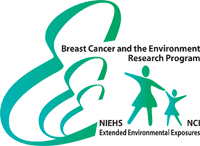
On this page...
Overview
The Breast Cancer and the Environment Research Program (BCERP) was a joint effort co-funded by the National Institute of Environmental Health Sciences (NIEHS) and the National Cancer Institute (NCI). BCERP began with the Breast Cancer and the Environment Research Centers (BCERC) in 2003. BCERP supported a multidisciplinary network of scientists, clinicians, and community partners to examine the effects of environmental exposures that may predispose a woman to breast cancer throughout her life.
BCERP-funded projects incorporated a transdisciplinary approach, involving collaborations between different scientific disciplines to address a common research question. Each BCERP project was comprised of a biology study, a human study, and a community engagement component. This broadened research focus added to the growing knowledge of environmental and genetic factors that may influence breast cancer risk across the lifespan and reflects recommendations made by the Interagency Breast Cancer and Environmental Research Coordinating Committee (IBCERCC) in 2013.
Learn more about the BCERPPublications
BCERP published more than 150 scientific manuscripts. View a list of BCERP publications![]() .
.
Additionally, the BCERP community partners have developed a wide range of outreach and educational materials related to normal breast development and how exposure to chemicals that act like hormones in the body during specific developmental periods might influence breast cancer susceptibility. View BCERP education and outreach materials![]() .
.
Contacts
NIEHS Contacts
- Program Lead:
- For basic science questions:
NCI Contacts
- For cancer epidemiology questions:
- For basic science questions: